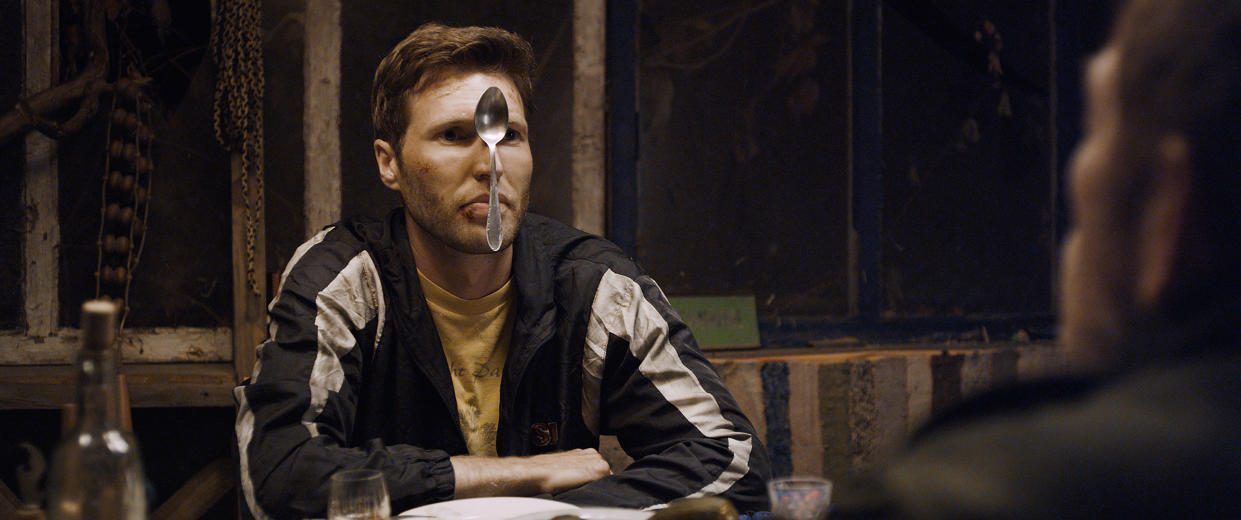Film Review: ‘Volcano’

Make room on the bench, Sergei Loznitsa (“Donbass”). Scoot along, Myroslav Slaboshpytskiy (“The Tribe”). It’s time to share the title of contemporary Ukraine’s most intriguing filmmaker with helmer Roman Bondarchuk, an erstwhile documentarian (“Ukrainian Sheriffs”), who makes a mesmerizing fiction debut with “Volcano.” An impressively shot drama marbled with welcome notes of absurdist comedy and wry humor, the movie is set in southern Ukraine’s Kherson province, just above Crimea, where a Kiev-based interpreter for the Organization for Security and Cooperation in Europe (OSCE) finds himself stranded after a series of misadventures. Following its world premiere in Karlovy Vary last July, the consistently involving film has screened at more than 30 international festivals and collected numerous kudos. Its Ukrainian theatrical rollout begins April 5.
Thirtysomething Lukas (Serhiy Stepansky, a renowned sound designer making his acting debut) is driving three international OSCE personnel on an inspection tour of military checkpoints when their SUV breaks down on a dirt road in the steppe. He goes to seek help — or at least a spot with cellphone coverage — but when he returns to the crossroads where he left the vehicle, neither car nor colleagues are to be found. It’s the first indication of the lawless universe into which he’s fallen. Like Alice through the looking glass or Dorothy in Oz, Lukas provides an innocent outsider’s view of an anarchic parallel world.
Related stories
'Weeds' Cinematographer Steven H. Smith Dies at 68
'After Earth,' Picking Up the Pieces
Lukas finds refuge in the village of Beryslav, at the home of eccentric dreamer Vova (Viktor Zhdanov), who, during the Communist era, was the head of a local fishery that no longer exists. Vova lives with his elderly mother (Tamara Sotsenko) and nubile daughter Maryushka (Khrystyna Deilyk) in a large, ramshackle hilltop house furnished with oddball tapestries. Outside, the yard is dotted with cast-off bathtubs, a small boat and even a replica of the Statue of Liberty that matches the tattoo on Vova’s leg. They overlook an artificial lake, made in Soviet times by flooding neighboring villages, where a loose buoy floats tantalizingly out of reach and mirages sometimes make themselves seen, and even heard. Vova’s family members find strength in the land and the things they build, grow and make for themselves. They face disaster with humor and irony and know how to roll with the punches, unlike clean-cut, strait-laced Lukas.
After unfortunate events result in Lukas losing his passport, wallet and expensive watch — and encounters with the local police, private enforcers and feuding villagers leave him beaten and bloody — he hits a low point. But he is seduced by the oddness and beauty around him, as well as by the lovely Marushka, and he eventually comes to regard his strange circumstances as a chance to begin again.
Part of the film’s appeal lies in its unsettling, dreamlike strangeness, supported by the understated, quasi-episodic editing of Mykola Bazarkin and Heike Parplies. Between the end of one scene and the beginning of the next, there is space for dire or delicious events to occur off camera or in the viewer’s imagination.
One might also chalk up some of the weirdness to life in the borderlands, in a region far from any central authority; it’s a place that time seems to have left behind. Nevertheless, current events intrude on daily life: Russia’s annexation of neighboring Crimea is noted through television commentary, and the war in the East is acknowledged through a benefit for young soldiers.
Co-scripter Bondarchuk was born in Kherson province, where prize-winning documentary “Ukrainian Sheriffs” was set, and clearly loves the region and its people. The Vova character is based on his co-producer/co-screenwriter/wife Dar’ya Averchenko’s unconventional uncle. Co-screenwriter Alla Tyutyunnyk also hails from the region. The casting of local non-pros, who have their own distinct way of speaking and moving, also brings authentic ambience.
Bondarchuk and his cinematographer Vadym Ilkov (also a documentary director) make the most of their precisely chosen, surreal and, at times, sinister-appearing locations, including: a vast expanse of land where tall, dried sunflowers stand guard like soldiers around a deep pit; the watermelon fields where pickers work like slaves under the hostile eyes of private security services; the heavens at night, which suddenly explode with fireworks; and a daytime sky in which white parachutes blossom like clouds. Even Vova’s rambling house expresses the man’s once grand dreams of success and a large family.
The hypnotically beautiful score by Ukrainian composer Anton Baibakov and the compelling sound design by Borys Peter are essential to the film’s affect. For the theatrical release, a plaintive song from Ukrainian folk quartet DakhaBrakha (creators of a song for the “Fargo” TV series soundtrack) was added under the credits.
Sign up for Variety’s Newsletter. For the latest news, follow us on Facebook, Twitter, and Instagram.

